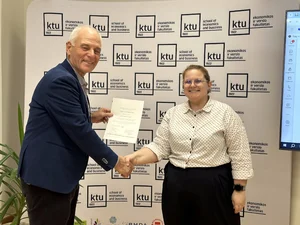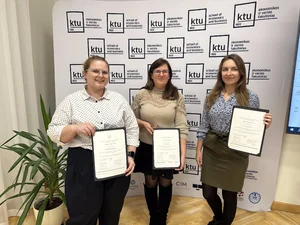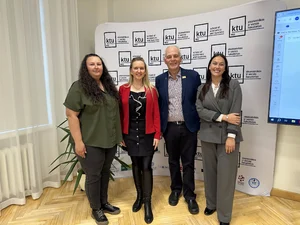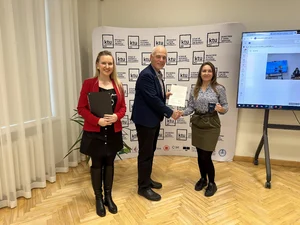This autumn, for the first time in Lithuania, the IGPRC2024 Research Pitch Competition took place at Kaunas University of Technology (KTU). During the event, three early career KTU researchers were awarded the opportunity to participate in the competition’s semifinals.
The event that took place at KTU is part of the global InSPiR2eS Global Pitching Research Competition 2024 (IGPRC2024). Its goal is to provide a platform for young researchers to present their scientific work clearly and effectively, reaching both the academic community and the wider public. The competition at KTU was organised in collaboration with Professor Robert Faff, the founder and president of the global research network InSPiR2eS.
During his two-week visit, Professor Faff conducted research pitch training sessions, offered individual consultations to KTU’s doctoral students and early career researchers, and helped candidates prepare for the competition.
Conveying research ideas in concise and clear way
During the event at KTU, competitors were asked to convey their research ideas in a structured format with 1,000 words using Faff’s (2014, SSR) “Pitching Research Framework” (PRF). The jury assessed the research pitches based on several criteria closely aligned with Faff’s (2014) “five golden rules”: clarity and focus; meaningfulness; based on real effort; seamlessly unified; and able to start a conversation with a field expert.
The competition at KTU was won by Dr Eglė Butkevičiūtė, Dr Aušra Gadeikytė from the Faculty of Informatics, and Dr Joana Ramanauskaitė from the School of Economics and Business. The three early-career researchers were awarded the opportunity to participate in the IGPRC2024 semifinals. The finalists of the IGPRC2024 will compete for an impressive prize pool of 20,000 Australian dollars.
Research that changes people’s lives
“This pitch competition encouraged me to properly formulate and describe the idea, to look at the planned research from a different angle and helped me to effectively present the significance of the study,” says Dr Butkevičiūtė from the KTU Faculty of Informatics.
The research that she presented at the competition focuses on improving the accuracy of real-time stress and fatigue detection from PPG signals by applying advanced noise reduction techniques. Her study aims to make personal health monitoring more accessible and impactful, especially for young students balancing work and studies. According to the researcher, her work could directly influence individual health management and the design of future health applications.
She believes that the proposed models will enable clothing designers to predict the thermal comfort properties in the early design stage.
Dr Joana Ramanauskaitė’s from the School of Economics research aims to help organisations navigate increasingly stringent regulations by clarifying expectations for sustainability communication. Dr Ramanauskaitė also suggests that sustainability communication may influence an organisation’s sustainability transition, while the transition itself can shape how sustainability is communicated. This bidirectional relationship will be explored through empirical testing. She noted that preparing for the competition enhanced both her research idea and her ability to present it to a broader academic audience.
Gaining valuable skills
Committee member Associate Professor Dr Viktorija Varaniūtė notes that by observing how other researchers pitch their ideas, PhD students and early career researchers can learn effective communication strategies for presenting their work clearly and concisely.
Attending a research pitch is a practical and enriching experience that supports academic and professional growth for PhD students and young researchers but is also a way to engage a society in research ideas.
“In an era of information overload, it’s crucial for scientists to focus on highlighting the most essential aspects of their research. During IGPRC2024, jury observed that while some participants excelled in written research presentations, others demonstrated stronger oral presentation skills. Our goal was to select candidates who successfully combined both abilities while also managing stress and time effectively,” says Dr Meda Andrijauskienė, a jury member and a Vice-Dean for research at KTU School of Economics and Business.
The IGPRC2024 competition is open to early career researchers from all fields. Therefore, all KTU doctoral students and early career researchers who earned their doctoral degree within the last five years were invited to participate. Dr Gerulaitienė was delighted to see candidates from diverse scientific fields registered for the competition.
“In today’s scientific world, the ability to present research effectively in a short time is crucial for scientists across all disciplines. It is a skill that is valuable both in academia and in business when communicating the value of research to a broader audience,” emphasises Dr Gerulaitienė.
She thanks to the Dean of KTU’s Faculty of Economics and Business, Kęstutis Duoba, for supporting the IGPRC2024 Research Pitch Competition at KTU.






